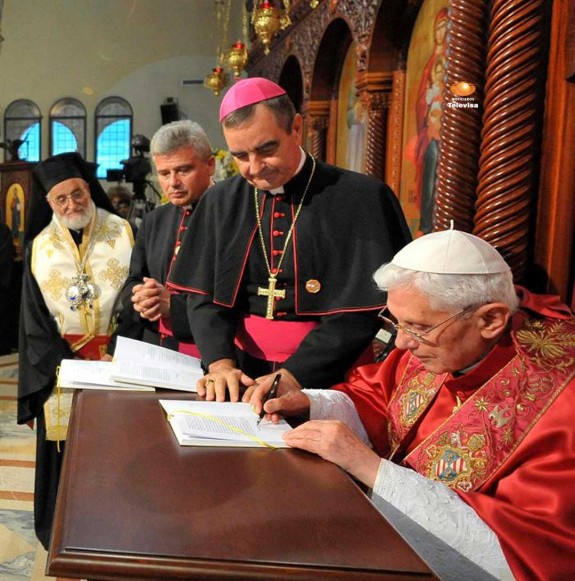This morning, I attended a staff meeting where we spent over three hours dissecting and reflecting on parts of Pope Benedict’s recent apostolic exhortation delivered in Lebanon. Many Catholics, I suspect, haven’t read it, or read it closely. But in the course of just 100 paragraphs, The Holy Father presents some challenging and timely themes that have special resonance in the Middle East, but also speak eloquently to people of faith everywhere. (If you want a preview of his reported upcoming encyclical on Faith, due in January of 2013, I suspect you just may find some key ideas in this exhortation.)
26. Religious freedom is the pinnacle of all other freedoms. It is a sacred and inalienable right. It includes on the individual and collective levels the freedom to follow one’s conscience in religious matters and, at the same time, freedom of worship. It includes the freedom to choose the religion which one judges to be true and to manifest one’s beliefs in public.[21] It must be possible to profess and freely manifest one’s religion and its symbols without endangering one’s life and personal freedom. Religious freedom is rooted in the dignity of the person; it safeguards moral freedom and fosters mutual respect. Jews, with their long experience of often deadly assaults, know full well the benefits of religious freedom. For their part, Muslims share with Christians the conviction that no constraint in religious matters, much less the use of force, is permitted. Such constraint, which can take multiple and insidious forms on the personal and social, cultural, administrative and political levels, is contrary to God’s will. It gives rise to political and religious exploitation, discrimination and violence leading to death. God wants life, not death. He forbids all killing, even of those who kill (cf. Gen 4:15-16; 9:5-6; Ex 20:13).
27. Religious tolerance exists in a number of countries, but it does not have much effect since it remains limited in its field of action. There is a need to move beyond tolerance to religious freedom. Taking this step does not open the door to relativism, as some would maintain. It does not compromise belief, but rather calls for a reconsideration of the relationship between man, religion and God. It is not an attack on the “foundational truths” of belief, since, despite human and religious divergences, a ray of truth shines on all men and women.[22] We know very well that truth, apart from God, does not exist as an autonomous reality. If it did, it would be an idol. The truth cannot unfold except in an otherness open to God, who wishes to reveal his own otherness in and through my human brothers and sisters. Hence it is not fitting to state in an exclusive way: “I possess the truth”. The truth is not possessed by anyone; it is always a gift which calls us to undertake a journey of ever closer assimilation to truth. Truth can only be known and experienced in freedom; for this reason we cannot impose truth on others; truth is disclosed only in an encounter of love.
You’ll find some intriguing ideas about religious life (he mentions, more than once, diakonia), marriage, the role of women (what he says may raise some eyebrows), shared sacraments, ecumenism, conscience and much more.












